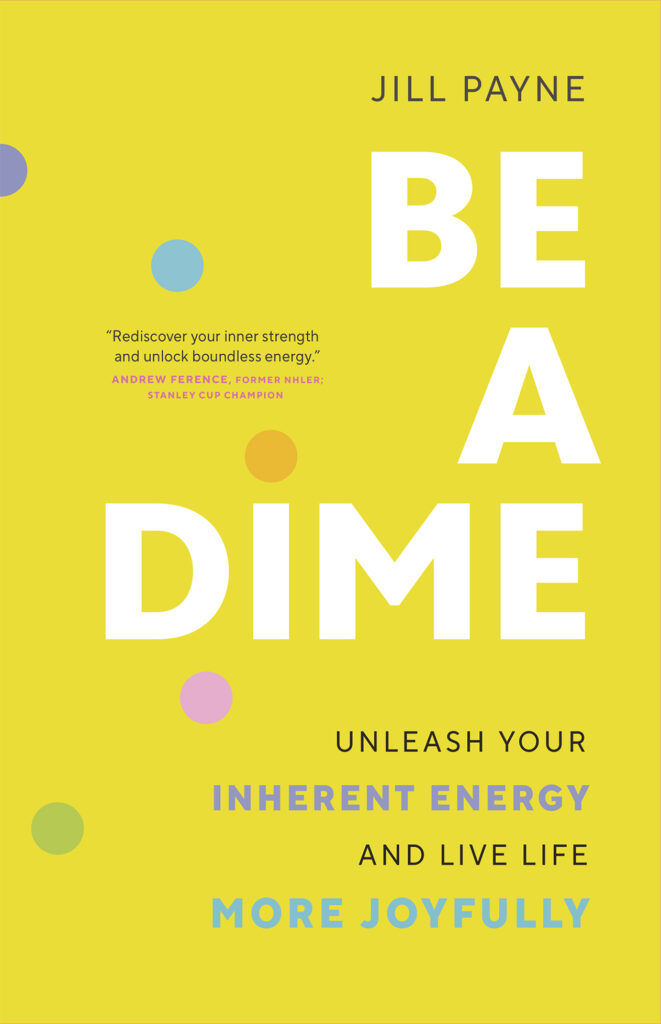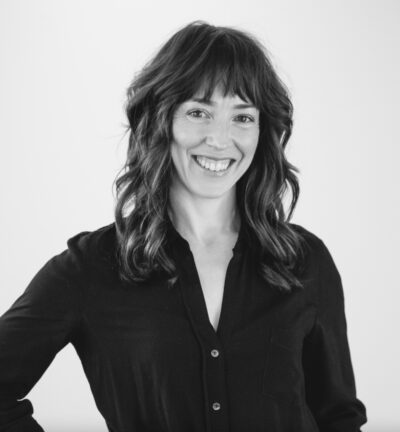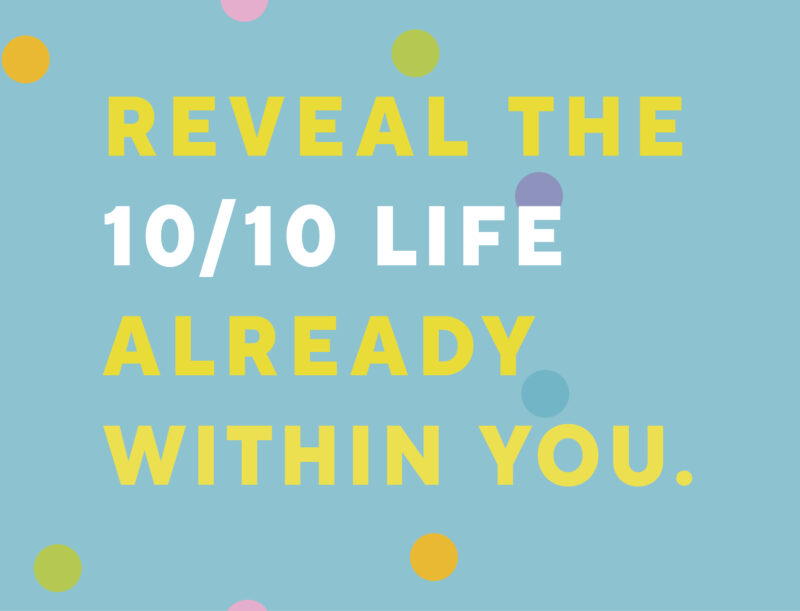Rising above self-help noise
Be A Dime: Unleash Your Inherent Energy and Live Life More Joyfully
by Jill Payne
Vancouver: Figure 1 Publishing, 2024
$22.95 / 9781773272146
Reviewed by Jeffrey Stychin
*

I’ll bet you’ve seen the laundry list of self-help books on shelves at your neighbourhood bookstores, or seen the multitude of cacophonic shorts flying past your doom-scrolling eyes as you commute or distracting you from your important tasks. They tout all of the same rhetoric as the next: conquer your fears, don’t internalize others’ opinions, consistency is key, and many other phrases and jargon to curtail your dopamine and inspire your newfound confidence, all to no avail. Well, De A Dime: Unleash Your Inherent Energy and Live Life More Joyfully is sort of like that, but in a much more nuanced and intriguing way because author Jill Payne doesn’t approach your turmoil with the same lackluster blasé, but rather a compassionate ingenuous approach to which I felt really connected.
I believe we all have unknown reserves of strength within us, and I want to help you harness energy and vitality so you can live a truly joyful and fulfilled life. All you need is already within you. You just have to learn how to access it.
I’ve grown up a very pessimistic person, one who has seen many troubles and untrusting situations, which I’m sure many of you have experienced as well. As someone who has struggled with procrastination, depression, and anxiety, it has been difficult navigating the world without much support. Yet, in these pages I found myself a growing kinship to the author as I read through this multifaceted journey. Payne truly recognizes the human struggles we all share and coaxes a voice of support from within yourself to be heard.
I was single, pregnant, and in survival mode. Instead of slowing down to fully process the trauma of my partner’s abrupt departure, I kept traveling and speaking. . . Like most of you, I was rocked to the core by the global pandemic.
Payne refers to “diming” as advocating for yourself through action, regardless of external conditions. It’s another way of saying that to make progress you have to start internally and change the perspective of what you’ve been dealt. However, when you think about any response to your life, the space inside your mind requires nothing external for well-being.
Don’t wait for external conditions to change! Be your own advocate, improve your mental state, and watch the conditions follow suit. . . I like to think of each of the numbers on the Dime scale of 1 to 10 as a channel. Every day, we tune into different channels at various times. You could start your day at a 7, move down to a 3 at noon, flip back up to a 5 mid-afternoon, and end your day at an 8. What I want for you is less channel surfing.

I find that knowing this is inherent but reading this helps pave a more clearly ingrained perspective, that you can take with you as a helpful reminder. I appreciate so greatly Payne’s mission to disrupt the generally bonded negative discourse that circulates our day to day lives. When was the last time you remember where everyone you encountered was positively spinning their dilemmas?
It’s human nature to dwell on the negative, but we give it more power by feeding it, and the details are the fuel. Dwelling on the negative is also catching. People often connect through sharing detailed negative experiences.
Next, Payne starts to discuss the effects of physical movement on mood and overall productivity, self-compassion, and personal growth. Don’t you remember before the pandemic, how much more close-knit and connected the world felt? You could potentially have a conversation with a stranger in transit, or hug a friend when you meet them for coffee? The world we occupy has seemingly become mentally and socially more distanced than ever before and there is a big problem because of this, according to Payne.
Considering the importance of touch, it’s no surprise that with social distancing and the slow return to comfortable physical contact, depression and loneliness have skyrocketed since the pandemic began… Moving up the scale toward being a Dime starts with getting in touch with our own body. When we make the effort to move our bodies in certain simple ways, we are telling our nervous system to see the world differently.
Now, that quote resonates. I have recently begun a physical routine of exercise and cycling that largely improves my mood and sets me up for a more productive day ahead. Even the simple act of controlling upright posture for me, personally, helps a lot. I’d like to hope that if you undertook any physical change in your routine, it would be equally as beneficial! This seems all well and good, doesn’t it? Remember that the most vital step is outlined in the latter parts of this book where Payne examines the mind’s role in focus and perception of outlook.
When you’re confronted with a problem, do you listen to your brain broadcasting worst-case scenarios or best-case scenarios? The human tendency is to listen to the old favourites playlist, which is 95 percent worrying about what could go wrong and 5 percent coming up with ideas or solutions. We need to update our station selection and reverse that tendency.
What a wonderfully concise thought here, as Payne reinforces the importance of perspective in thought. I am such a victim to these patterns and after reading this book it is a nice reminder to have a self-check during arduous times of uncertainty.
I am not much for self-help books, especially when there is such a myriad of content grappling for our attention, where do you turn and where do you find solace and results? I cannot tell you, but I can tell you that if you’re looking for a book that speaks hard truths and combined with uplifting hope that you possess the path out of your own blockages, to perceive the world you find yourself, in a new light that isn’t so dark, then Be A Dime is right for you.
What you choose to focus on and what you expect to happen will affect the way you show up at your destination.

*

Jeffrey Stychin studied verse and poetry through music and art. He began writing as a means of catharsis and as a way to communicate with himself and others. A Vancouver barber by day, a poet by night, he currently resides with his thoughts and dreams in a quiet place full of trees. [Editor’s note: Jeffrey Stychin has recently reviewed books by Nathan Hellner-Mestelman, Lisa Hartley, Colin Upton, Darren Groth, Earle Peach, and Sonja Ahlers for The British Columbia Review.]
*
The British Columbia Review
Interim Editors, 2023-25: Trevor Marc Hughes (non-fiction), Brett Josef Grubisic (fiction and poetry)
Publisher: Richard Mackie
Formerly The Ormsby Review, The British Columbia Review is an online book review and journal service for BC writers and readers. The Advisory Board now consists of Jean Barman, Wade Davis, Robin Fisher, Barry Gough, Hugh Johnston, Kathy Mezei, Patricia Roy, Maria Tippett, and Graeme Wynn. Provincial Government Patron (since September 2018): Creative BC. Honorary Patron: Yosef Wosk. Scholarly Patron: SFU Graduate Liberal Studies. The British Columbia Review was founded in 2016 by Richard Mackie and Alan Twigg.
“Only connect.” – E.M. Forster
One comment on “Rising above self-help noise”